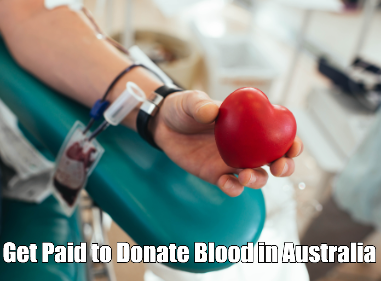
Blood donation is a vital practice that saves lives every day. Hospitals and medical centers rely on volunteer donors to supply the blood used in surgeries, emergency treatments, and other medical procedures. But what if you could combine doing something life-saving with earning extra cash? The idea of getting paid to donate blood has been gaining attention recently, especially in countries where donations come with financial compensation. This article explores if it’s possible to get paid to donate blood in Australia and dives into the ethical and practical aspects of turning this life-saving act into a paid endeavor.
The Current State of Blood Donation in Australia
Blood donation in Australia relies entirely on the good will of the nation’s citizens. The country follows a strict voluntary donation system, meaning donors are not compensated financially for contributing their blood or plasma. Non-profit organizations, such as the Australian Red Cross Lifeblood, oversee blood collection and distribution. These organizations encourage people to donate purely out of altruism—emphasizing the critical role the donations play in saving lives and supporting the community.
Currently, Australia requires over 1.7 million blood donations each year to meet medical needs. While the demand for blood is constant, attracting enough donors remains a challenge. Efforts typically center on raising awareness of the urgent need for blood and making the process as convenient as possible for donors.
Despite the shortage in blood donations at times, Australian laws prohibit compensating donors beyond small tokens of appreciation like snacks or drinks offered after the session. But what if Australia shifted gears? Would introducing paid blood donations increase donations and improve healthcare outcomes?
Can You Get Paid to Donate Blood in Australia?
If you’re specifically looking to earn money by donating blood, you might be disappointed. Under Australia’s current system, there’s no direct pathway to receive cash for blood or plasma donation. This aligns with international standards set by the World Health Organization (WHO), which advocates for voluntary, unpaid donations as the best practice.
However, there are countries that have embraced the concept of compensated blood donation. To understand why paid donations work in some nations and not in others, it’s important to examine the ethical and practical implications of paying people to give blood.
Comparing Australia to Paid Donation Systems Overseas
While Australians can’t earn money donating blood, many developed countries compensate donors. For example:
- United States: Paid plasma donation is common. Donors typically earn between $30 and $50 per session. Plasma collection centers are run by private companies, and plasma is often sold internationally for medical and pharmaceutical purposes.
- Germany and Austria: Plasma donors are reimbursed for their time, earning up to €25 per donation.
- China and some other nations also offer financial incentives for plasma collection to meet growing healthcare demands.
- United Kingdom: Blood donation is unpaid, similar to Australia, to maintain ethical standards and ensure the system’s safety.
- India: Policies strictly discourage paid blood donation, as it has been linked to quality and safety issues.
Countries that compensate blood or plasma donors often face similar core issues—there isn’t enough voluntary donation to keep up with demand. By offering financial rewards, these programs aim to attract more donors and maintain stable supplies, particularly for plasma, which is used in many medicines.
Why Not Pay Donors in Australia?
One of the main reasons Australia remains committed to voluntary donations is the ethical concern that paid systems undermine the altruistic nature of the act. There’s a fear that compensating people might attract higher-risk donors or individuals who prioritize the financial reward over honestly meeting eligibility requirements. Such risks could compromise the safety of the blood supply. Additionally, there’s the argument that financial incentives might exploit vulnerable populations, such as low-income individuals.
On the flip side, advocates for payment systems argue that compensating donors could resolve constant shortages and boost the availability of life-saving materials like plasma for advanced medical research and therapies. Plasma, in particular, is in high demand globally, and Australia imports a significant proportion of its plasma-derived products from countries like the U.S., where donor compensation is allowed.
Paid Plasma Donation in Australia
Although blood donation itself is unpaid, some plasma donors receive reimbursement for their time and effort. Plasma, the liquid part of your blood, contains important proteins that treat conditions such as autoimmune disorders and hemophilia. Unlike whole blood, plasma donations can be made more frequently — up to every two weeks — because the process allows your body to recover relatively quickly.
Several private organizations operate plasma donation centers in Australia. These facilities often offer financial incentives or gift cards as compensation. This payment isn’t framed as buying plasma, but rather as recognition of the donor’s time and commitment.
To check if plasma donation is an option for you, it’s best to research specific centers in your area and carefully review their requirements.
What’s the Difference Between Plasma and Blood Donation?
While whole blood donation involves giving all components of your blood — red cells, platelets, and plasma — plasma donation is more specialized. A machine separates the plasma from your blood during the donation process, returning the remaining components back to your body. This adds complexity and time to the donation process, which is why plasma donors are sometimes compensated.
If you’re interested in plasma donation, remember that your health and safety should come first. Make sure any facility providing compensation operates under proper medical regulations.
The Donation Process in Australia
Whether you’re considering donating blood out of goodwill or exploring your options, understanding the process is essential. Here’s a clear breakdown of what happens when you donate blood in Australia:
- Registration
You’ll begin by filling out a form with your personal details and medical history. This step ensures your blood is safe for use. - Health Assessment
A professional will check your vital signs, measure your hemoglobin levels, and ask more detailed questions about your lifestyle and recent travel. - Donation
If you’re eligible, the donation itself takes around 10-15 minutes for blood and up to an hour for plasma. Skilled staff will collect your blood with minimal discomfort. - Recovery Area
After donating, you’ll be asked to sit down, rehydrate, and grab a snack. It’s a chance to relax before continuing your day. - Testing and Distribution
Your blood will undergo rigorous testing to ensure it’s safe for transfusion or further processing. Once cleared, it’s sent to hospitals or pharmaceutical labs.
Donating doesn’t just end here. You’ll receive updates on where your blood went or how it was used—an inspiring reminder of how you’ve helped someone.
Eligibility Criteria for Blood Donation
Not everyone can donate blood, as it’s essential to maintain the safety of both the donor and the recipient. Here are some key requirements in Australia:
- Age and Weight
You must be between 18 and 75 years old and weigh at least 50 kilograms. - Health
Donors should be in good overall health. If you’re feeling unwell, it’s better to reschedule. - Medications and Medical Conditions
Some medications or medical conditions might disqualify you from donating temporarily or permanently. For example, recent surgeries, anemia, or certain infections could affect eligibility. - Lifestyle Factors
Your lifestyle is an important consideration. Questions about recent piercings, tattoos, and travel to certain countries will be part of the assessment.
Always check with Lifeblood or your local donation center for the most up-to-date eligibility guidelines.
Potential Benefits of Compensated Blood Donation
If Australia were to allow paid donors, what would be the potential impact? While there are ethical concerns, offering financial incentives could have distinct benefits, including:
- Increasing Supply
Offering compensation could encourage more people to donate regularly, leading to higher supplies of both blood and plasma. - Filling Critical Gaps
Plasma is an area where Australian supplies often fall short. Compensating donors might help Australia reduce its reliance on imports. - Easing Accessibility
Low-income communities could benefit from a system that rewards them for their time while contributing to healthcare needs. - Supporting Research
A steady flow of plasma could mean an accelerated development of pharmaceuticals and therapies, benefitting more patients in the long run.
Ethical Considerations for Paid Blood Donation
While there are clear benefits, ethical concerns must be addressed before implementing such a system:
- Exploitation Risk
Critics argue that compensating donors could exploit vulnerable populations desperate for income. - Safety Concerns
Paid systems must enforce strict guidelines to prevent risks like falsified eligibility forms or unsafe donations. - Undermining Altruism
Turning donation into a transaction could diminish the voluntary spirit that fosters trust and solidarity within communities.
Real Stories from Blood Donors
The experience of donating blood in Australia remains deeply rewarding, even without financial compensation. Many Australians share inspiring stories about how donating has positively impacted their lives.
For instance, Sarah, a 34-year-old nurse, has been a blood donor for over 10 years. “I started donating to help others, but along the way, I’ve developed a sense of pride in giving back to my community,” she says. “Every time I donate, I feel like I’m making a difference.”
Mark, a 50-year-old father of two, began donating plasma because his son required life-saving plasma therapy after a medical emergency. “I can’t put a price on the lives saved by donations. I’m thankful every time I sit in that chair,” he reflects.
Looking Ahead
Currently, the Australian government and its health organizations have chosen to stick with the voluntary model, citing the ethical implications and the proven safety of its existing system. However, if demand continues to outstrip supply, a debate on alternatives—like paying plasma donors—might grow louder.
For now, the system relies on Australians’ generosity and willingness to donate out of concern for others. Even without financial compensation, donors receive the priceless satisfaction of knowing they’ve helped save lives.
If you’re interested in donating blood in Australia, you can visit the Australian Red Cross Lifeblood website to find your nearest clinic and learn more about the process. While you won’t earn money by donating blood in Australia, the sense of contribution and the real difference you make in others’ lives is its own reward.




